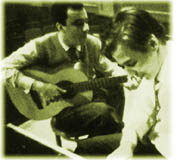

BOSSA NOVA
| "bonfá and powell">> | recommendations • brasil guide • pryngo guide • contact pryngo • amazon.com | |
 |

BOSSA NOVA |
|
 |
TOM JOBIM AND JOÃO GILBERTO INVENT BOSSA The Copacabana neighborhood of Rio de Janeiro in the late 1950's developed a middle class with a taste for imports like American jazz and French film. Local nightclub performers included Baden Powell, Sérgio Mendes, and Durval Ferreira. Antonio Carlos Jobim began his career among them, having already studied composition with an advocate of Schoenberg's modern tonalities and discovered the culture-blending innovations of Villa-Lobos. His more immediate models for composition were Pixinguinha and Ary Barroso, and his sense of Brasilian rhythm overshadowed classical and modernist models of music. With a friend, Newton Mendonça, he began songwriting. It was in this early period that he first met guitarist João Gilberto who would soon forge a new rhythmic playing style. An example of bossa without João is the soundtrack to Orfeu Negro in 1959, which introduced the sound to many international audiences. The rhythm of the samba is present when the bateria of percussionists plays into the mix but Luiz Bonfá's guitar is not so distinguishable from Dorival Caymmi's of a decade earlier. The culmination of bossa nova, or "new touch", sprang from the combination of João's rhythm and Tom's compositions. What was the rhythm? It was samba stripped down to its essentials. And the combination saw the light of day with Gilberto's recording of "Chega de Saudade." The initial single received very little praise, but with the worldwide success of Bonfá's joyous composition, "Manhã de Carnaval," ears very quickly began to open. Tom Jobim's compositions used complex chords and modalities popularized in jazz under lyrics by himself and a handful of Brazil's finest writers, including Vinícius de Moraes. But the similarities in modalities and in sensibility led to criticism that bossa was watered down "cool" jazz and nothing more, a criticism even more compelling after hearing Muzak versions of "The Girl From Ipanema" for decades. And it was with the help of American jazz players that Tom and João broke into music charts worldwide. But return to the original recordings and the integrity of the compositions, the finesse of the performances, and true national identity of the music is inescapable. |
|
 |
 |
|
 |
 |
|
|
BLACK ORPHEUS, original soundtrack THE LEGENDARY JOÃO GILBERTO, João Gilberto (out of print) GETZ/GILBERTO, Stan Getz, João Gilberto, Tom Jobim AMOROSO/BRASIL, João Gilberto LIVE IN MONTREUX, João Gilberto JOÃO, João Gilberto THE GIRL FROM IPANEMA, João Gilberto, Tom Jobim, Elis Regina, et al. |
||
 |
 |
|
| THE BRAZILIAN SOUND, Chris McGowan, Ricardo Pessanha | ||
 |
 |
|
| BOSSA NOVA - MUSIC AND REMINISCENCES | ||
 |
 |
|
 |
 |
|